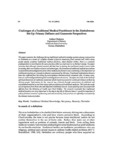Please use this identifier to cite or link to this item:
https://cris.library.msu.ac.zw//handle/11408/1828Full metadata record
| DC Field | Value | Language |
|---|---|---|
| dc.contributor.author | Chakawa, Joshua | - |
| dc.date.accessioned | 2016-10-06T14:41:45Z | - |
| dc.date.available | 2016-10-06T14:41:45Z | - |
| dc.date.issued | 2015 | - |
| dc.identifier.issn | 1815-9036 | - |
| dc.identifier.uri | http://hdl.handle.net/11408/1828 | - |
| dc.description.abstract | The paper examines the challenges facing traditional medical knowledge systems among communities in Zimbabwe as a result of a complex number of factors emanating from colonial rule. While many people openly condemn traditional medical practices, when disaster strikes, there is a common predisposition to revert back to the same practices either as a last resort or as the best remedy. The paper indicates that although colonial masters did their best to destroy the traditional medical sector while promoting their own medical sciences and technologies, the formation of traditional medical associations coupled with acknowledgements from white medical practitioners was a testimony of the importance of traditional practices as a remedy to ailments experienced by Africans. Traditional medical practitioners have also suffered from bio-piracy by unscrupulous pharmaceutical companies who, in many cases, have not acknowledged obtaining that knowledge from such sources. The paper also looks at the medical/spiritual dimension of traditional medicines which in part accounts for continued reliance on them by African people. Information for the research was obtained through examination of published and unpublished material as well interviews with practitioners of traditional medicine. The work also made use of responses from those who seek help from traditional sources. Issues of policy were discussed with officials from the Ministry of Health and Child Welfare. The research concluded that traditional medical practices are very important to the day to day life of Africans hence it would be important if policy positions aimed at regularizing and mainstreaming such practices are officially enunciated by the relevant statutory bodies. | en_US |
| dc.language.iso | en | en_US |
| dc.publisher | Midlands State University | en_US |
| dc.relation.ispartofseries | The Dyke;Vol. 9, No. 1; p. 29-40 | - |
| dc.subject | Traditional Medical Knowledge, Bio-piracy, Remedy, Herbalist | en_US |
| dc.title | Challenges of a traditional medical practitioner in the Zimbabwean set-up: primary definers and grassroots perspectives | en_US |
| dc.type | Article | en_US |
| item.languageiso639-1 | en | - |
| item.openairecristype | http://purl.org/coar/resource_type/c_18cf | - |
| item.grantfulltext | open | - |
| item.fulltext | With Fulltext | - |
| item.openairetype | Article | - |
| item.cerifentitytype | Publications | - |
| Appears in Collections: | Research Papers | |
Files in This Item:
| File | Description | Size | Format | |
|---|---|---|---|---|
| grassroots.pdf | Full Text | 7.9 MB | Adobe PDF |  View/Open |
Page view(s)
90
checked on Apr 5, 2025
Download(s)
142
checked on Apr 5, 2025
Google ScholarTM
Check
Items in MSUIR are protected by copyright, with all rights reserved, unless otherwise indicated.



